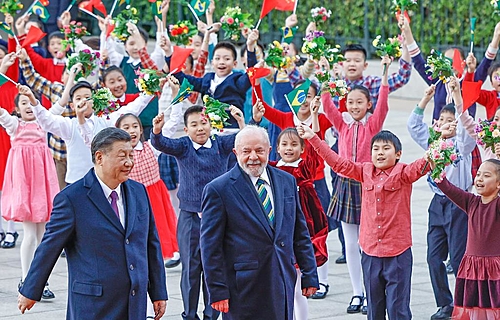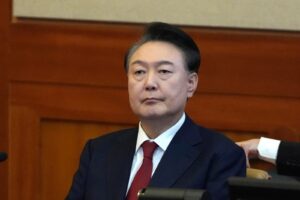
Lula and Xi Jinping met again after 14 years. Xi, at the time China’s vice president, met with Lula twice during his second term in 2009.
The Brazilian representative was received at the Great Hall of the People, in Beijing, headquarters of the Chinese National Assembly, with a ceremony that included 21 cannon fire salutes, military bands, troop parades and the greeting of children, a practice in the reception of chiefs of State that had not been held since the beginning of the pandemic.
After the ceremony, the presidents met for over an hour. In it, Xi affirmed that the countries have broad common interests and said that Lula is a longtime good friend of China. “It was with his intention and support that China-Brazil relations were able to make a great leap forward,” added Xi.
Both Lula, and the senior Brazilian officials who participated in the large delegation that came to China, emphasized that one of the main objectives of the mission was to restore relations between the two countries. One of the songs played at the ceremony was “Um Novo Tempo” by Ivan Lins, a song chosen by the Brazilian government, whose lyrics say: “In the new time/Despite the punishments/We are grown up/We are attentive/We are more alive”.
In the same tone, Xi said at the meeting with Lula that “China is willing to work together with Brazil to create a new future for Sino-Brazilian relations in the new era, for the greater benefit of both peoples, and play a role positive and important for regional and global peace, stability, prosperity and development”.
The Chinese president also spoke about China’s willingness to talk actively about “a strategic articulation between the joint construction of the New Silk Road and the reindustrialization of ‘Brazil’.
Although Brazil has not joined the Chinese infrastructure megaproject, which completes a decade this year, the joint statement between the countries highlighted that “Brazil and China have expressed interest in examining synergies between Brazil’s development policies and investment programs , including South American integration efforts, and China’s development policies and international initiatives, including the Belt and Road Initiative”, as the New Silk Road is also called.
More than 150 countries have already signed cooperation agreements under the initiative, which has invested trillions of yuan in infrastructure around the world, and which follows China’s policy of mutual benefit and win-win strategies.
Environment gains relevance in Brazil-China relations
As part of the expansion of the Global (or Comprehensive) Strategic Partnership, a Subcommittee on the Environment and Climate Change was created within the Sino-Brazilian High Level Commission for Concertation and Cooperation (COSBAN).

Xi Jinping and Marina Silva in Beijing / Ricardo Stuckert
“In 2004, when COSBAN was established […] we had 10 groups dealing with different subjects, but until then there was no specific subcommittee on the environment”, explained the Minister of the Environment and Climate Change, Marina Silva.
“There was an effort and a political and strategic understanding, both by President Lula’s government and by President Xi Jinping’s government, that it was necessary to place the issue of climate change, environmental protection, sustainable development at the highest level of priorities,” said Marina at the press conference held at the Brazilian embassy in Beijing this Friday (14).
In another joint statement, Brazil and China once again charged the countries of the Global North about their responsibility for the climate crisis: “we remain very concerned that climate financing provided by developed countries remains short of the commitment of US$ 100 billion per year , as has been the case every year since the target was set in 2009, even when the actual amount needed far exceeds that commitment.” At COP 27, in November last year, both Lula and China’s Special Envoy for Change Committee, Xie Zhenhua, had complained about non-compliance with the commitment.
China has made strides in renewable energy, both in generation and in infrastructure. In 2021, China became one of the 50 countries in the world that have more than 10% of their energy from solar and wind sources, according to the organization Ember. The country is also responsible for more than 80% of the major stages of solar panel manufacturing, according to the International Energy Agency.
new loans
The president of the National Bank for Economic and Social Development (BNDES), Aloizio Mercadante, announced an agreement with the Development Bank of China in the amount of R$ 6.5 billion. The information was released at a press conference.
Mercadante stated that R$4 billion of this amount will be ten-year loans, “which gives the BNDES plenty of time to operate with these resources and pass them on to investments in infrastructure, ecological transition, industry, innovation, science and technology.” The remainder will be 3-year loans.
During the seminar promoted by the Apex as part of the initial agenda of President Lula’s visit, the director of the capital market and sustainable finance area at the BNDES, Natalia Dias, had stated that the “gap” in investment in infrastructure in Brazil is about of 2% of GDP. According to Dias, the bank calculates that Brazil needs to invest US$ 460 billion over the next ten years to reduce the gap.
Editing: Thales Schmidt
Source: www.brasildefato.com.br

